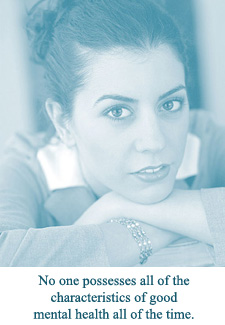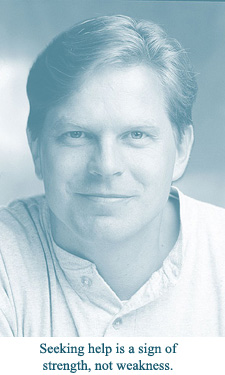 Characteristics of Mental Health Characteristics of Mental Health
Mental health is more than just the
absence of mental illness. It includes how you feel about
yourself and how you adjust to life events. However, the
National Mental Health Association cites 10 characteristics of
people who are mentally healthy.
-
They feel good about themselves.
-
They do not become overwhelmed by
emotions, such as fear, anger, love, jealousy, guilt, or
anxiety.
-
They have lasting and satisfying
personal relationships.
-
They feel comfortable with other
people.
-
They can laugh at themselves and
with others.
-
They have respect for themselves
and for others even if there are differences.
-
They are able to accept life’s
disappointments.
-
They can meet life’s demands and
handle their problems when they arise.
-
They make their own decisions.
-
They shape their environment whenever
possible and adjust to it when necessary.
It’s Okay to Ask for Help
 Many people are reluctant to use mental
health services because of the “stigma” of having an “emotional”
problem. Society has a tendency to view mental health issues
differently from medical ones. When someone breaks a leg, has
chest pains, or needs to get a prescription, they’ll see a
doctor. However, when they experience depression, excessive
fears, or a problem with alcohol, they may be embarrassed to
seek help. Many people view these conditions as “weaknesses”
they should handle themselves. Unfortunately, this view prevents
them from getting professional assistance that may alleviate
their problems. Many people are reluctant to use mental
health services because of the “stigma” of having an “emotional”
problem. Society has a tendency to view mental health issues
differently from medical ones. When someone breaks a leg, has
chest pains, or needs to get a prescription, they’ll see a
doctor. However, when they experience depression, excessive
fears, or a problem with alcohol, they may be embarrassed to
seek help. Many people view these conditions as “weaknesses”
they should handle themselves. Unfortunately, this view prevents
them from getting professional assistance that may alleviate
their problems.
To recognize an emotional problem and
receive help is not at all a sign of weakness. Rather, these
positive actions are characteristics of strong individuals.
Also, participating in your company’s Employee Assistance
Program (EAP) or seeing a therapist at a mental health clinic or
student counseling center is completely confidential. No
information will be released without your permission except in
situations involving child or elder abuse, or suicidal or
homicidal intent.
|